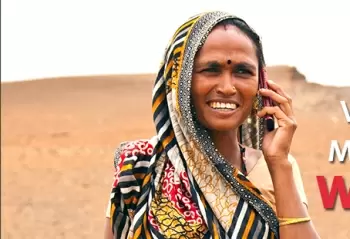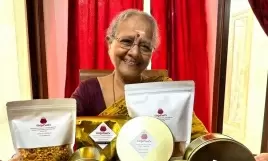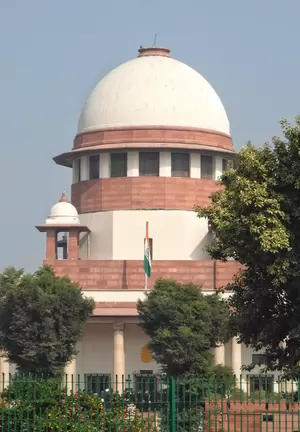Once you achieve success, everyone will start appreciating your efforts’
28-September-2015
Vol 6 | Issue 39
Once a quiet home-maker, an indulgent mother of three and a devoted wife, few in her sleepy village would have imagined that she would one day be making plans to build bridges and schools and solving some critical livelihood problems of her people.
Nonetheless, today, such activities are a part of Vandana Bahadur Maida’s daily life in Khankhandvi village of Madhya Pradesh.
 |
|
Vandana’s proactive approach has resulted in the creation of a pond to solve the chronic water shortage that the community used to face and establishment of a school in Khankhandvi (Photo: Gaganjit Singh)
|
Despite family opposition and prevalent patriarchal norms that define a woman’s place in society she not only stood for local elections but ended up becoming the first female head of her village panchayat.
Indeed, Vandana’s win was as path-breaking for her community as it was a surprise for her family – she superseded her own husband who used to be a member of the village council but never became its leader.
In India, quotas have spurred one of the greatest successes globally for women's empowerment and grassroots democracy. Just a decade ago, women comprised less than five per cent of the elected leaders in village councils.
Now, more than 40 per cent of local council leaders, over a million leaders in the countryside, are women. While others in her village go about their everyday routine - working the farms, running to fetch water or caring for livestock - articulate and determined Vandana has moved on to thinking of ways to bring long-lasting change and prosperity to her community.
Not only does Vandana make concerted efforts to raise the awareness levels of village council members about government schemes that can support sanitation, health and education, this dynamic leader is also known for delivering on her promises.
Thanks to the panchayat’s proactive approach they have managed to create a pond to solve the chronic water shortage that the community used to face and even built a school in Khankhandvi so that the children do not end up leaving their education the way Vandana had to after Class Eight.
In this one-on-one, the forward-looking leader talks about the challenges she faced in getting elected and the works she has been able to accomplish during her tenure.
Q: What have been the most important factors that have helped you in getting where you are today?
A: My interest in social development, my husband’s experience of being in politics at the panchayat level as panch [member], my family’s support and, of course, capacity building trainings organised by UN Women.
From there, I learnt all about the provisions of various government schemes, which helped me to perform my roles and responsibilities as sarpanch [head of the village council] and un-turn every stone that may be a hindrance in the development of the panchayat.
Q: What are some of the biggest obstacles you have faced so far?
A: The community at large opposed my candidature for the sarpanch election. They couldn’t believe a woman could be capable of running a panchayat. [My] relatives, too, were not in favour of my contesting the polls. Previously, my husband had served as a panch in the panchayat, so many people objected saying: ‘will she sit on a higher post than that of her husband?’
Q: Tell us a bit about your childhood, your ambitions and who inspired or influenced you?
A: My ambition was to work for the development of the community and to contribute to its uplift in whatever way I could. My dream was to do something for improving education. Fortunately, I got the chance to contest the panchayat elections and I won with a good margin. Finally, I got the opportunity to do something for the advancement of my people.
Q: How has being a woman affected your journey?
A: Initially, when I was contesting for the post of sarpanch, I myself was not very confident that a woman can be a sarpanch. Even the community members were not able to imagine a woman sitting on the chair of sarpanch and performing the roles and responsibilities.
Nonetheless, with the support of my husband, I took the plunge. I explained to the community my plans for the panchayat and the developmental work I had in mind. Finally, people supported me and I won with a good margin.
However, I did experience problems in the initial days of becoming sarpanch. Male panchayat members were constantly opposing my actions and decisions perhaps because I was quite unaware of the responsibilities of sarpanch and knew little about administrative procedures as well as the provisions of government schemes. Later though I developed an understanding of these things and now enjoy the full support of the people and panchayat members.
Q: What do you think is your greatest contribution to society/your community?
A: I have been responsible for completing many essential developmental projects in my panchayat, from getting wells dug and hand pumps sanctioned to building proper roads and toilets in the area. Besides this, some of the other major works that have been successfully completed include the construction of a pond in the village [water scarcity used to be a major issue of the panchayat], a primary school [there was no school in the panchayat and I was very interested in promoting education] and anganwadi centres (government sponsored child-care centres) in the faliyas (areas) where there was none.
More importantly, I [have] been able to spark an interest and sense of ownership among the people. They understand the importance of education, having toilets at home, maintaining proper sanitation and hygiene and participating in gram sabha meetings. They actively contribute to the meetings and raise their voice to demand their entitlements under various government schemes. Personally, I think this is my biggest achievement.
Q: What is your message for other women/girls who would like to follow in your footsteps? Any special advice for the younger generation?
A: To girls and women I want to say – be confident and follow your heart. The members of this patriarchal society will definitely oppose your every action.
They will criticise you, make fun of your choices, but in the end it is you who are going to fulfil your destiny. Once you achieve success, everyone will start appreciating your efforts. So just concentrate on your work and do it to the fullest. To the younger generation my advice is to do what you think is right for you. Be sure of your plans but let others criticise your efforts because they will surely acknowledge your success.
(This article is part of U.N. Women’s Empowering Women — Empowering Humanity: Picture It! campaign in the lead-up to Beijing+20.) - Women's Feature Service
















